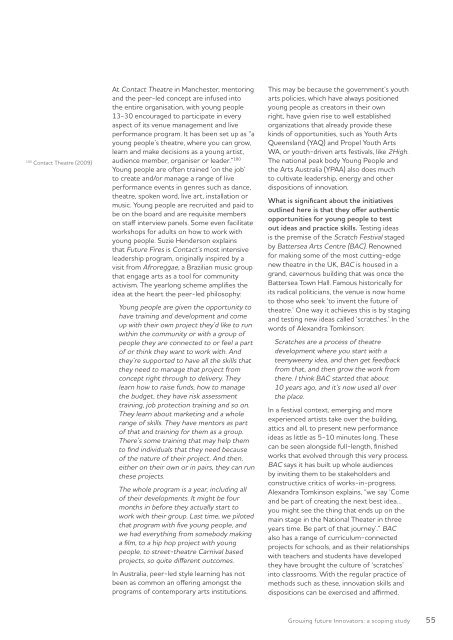GrowinG Future innovators - ARC Centre of Excellence for Creative ...
GrowinG Future innovators - ARC Centre of Excellence for Creative ...
GrowinG Future innovators - ARC Centre of Excellence for Creative ...
You also want an ePaper? Increase the reach of your titles
YUMPU automatically turns print PDFs into web optimized ePapers that Google loves.
180 Contact Theatre (2009)<br />
At Contact Theatre in Manchester, mentoring<br />
and the peer-led concept are infused into<br />
the entire organisation, with young people<br />
13-30 encouraged to participate in every<br />
aspect <strong>of</strong> its venue management and live<br />
per<strong>for</strong>mance program. It has been set up as “a<br />
young people’s theatre, where you can grow,<br />
learn and make decisions as a young artist,<br />
audience member, organiser or leader.” 180<br />
Young people are <strong>of</strong>ten trained ‘on the job’<br />
to create and/or manage a range <strong>of</strong> live<br />
per<strong>for</strong>mance events in genres such as dance,<br />
theatre, spoken word, live art, installation or<br />
music. Young people are recruited and paid to<br />
be on the board and are requisite members<br />
on staff interview panels. Some even facilitate<br />
workshops <strong>for</strong> adults on how to work with<br />
young people. Suzie Henderson explains<br />
that <strong>Future</strong> Fires is Contact’s most intensive<br />
leadership program, originally inspired by a<br />
visit from Afroreggae, a Brazilian music group<br />
that engage arts as a tool <strong>for</strong> community<br />
activism. The yearlong scheme amplifies the<br />
idea at the heart the peer-led philosophy:<br />
Young people are given the opportunity to<br />
have training and development and come<br />
up with their own project they’d like to run<br />
within the community or with a group <strong>of</strong><br />
people they are connected to or feel a part<br />
<strong>of</strong> or think they want to work with. And<br />
they’re supported to have all the skills that<br />
they need to manage that project from<br />
concept right through to delivery. They<br />
learn how to raise funds, how to manage<br />
the budget, they have risk assessment<br />
training, job protection training and so on.<br />
They learn about marketing and a whole<br />
range <strong>of</strong> skills. They have mentors as part<br />
<strong>of</strong> that and training <strong>for</strong> them as a group.<br />
There’s some training that may help them<br />
to find individuals that they need because<br />
<strong>of</strong> the nature <strong>of</strong> their project. And then,<br />
either on their own or in pairs, they can run<br />
these projects.<br />
The whole program is a year, including all<br />
<strong>of</strong> their developments. It might be four<br />
months in be<strong>for</strong>e they actually start to<br />
work with their group. Last time, we piloted<br />
that program with five young people, and<br />
we had everything from somebody making<br />
a film, to a hip hop project with young<br />
people, to street-theatre Carnival based<br />
projects, so quite different outcomes.<br />
In Australia, peer-led style learning has not<br />
been as common an <strong>of</strong>fering amongst the<br />
programs <strong>of</strong> contemporary arts institutions.<br />
This may be because the government’s youth<br />
arts policies, which have always positioned<br />
young people as creators in their own<br />
right, have gvien rise to well established<br />
organizations that already provide these<br />
kinds <strong>of</strong> opportunities, such as Youth Arts<br />
Queensland (YAQ) and Propel Youth Arts<br />
WA, or youth-driven arts festivals, like 2High.<br />
The national peak body Young People and<br />
the Arts Australia (YPAA) also does much<br />
to cultivate leadership, energy and other<br />
dispositions <strong>of</strong> innovation.<br />
What is significant about the initiatives<br />
outlined here is that they <strong>of</strong>fer authentic<br />
opportunities <strong>for</strong> young people to test<br />
out ideas and practice skills. Testing ideas<br />
is the premise <strong>of</strong> the Scratch Festival staged<br />
by Battersea Arts <strong>Centre</strong> (BAC). Renowned<br />
<strong>for</strong> making some <strong>of</strong> the most cutting-edge<br />
new theatre in the UK, BAC is housed in a<br />
grand, cavernous building that was once the<br />
Battersea Town Hall. Famous historically <strong>for</strong><br />
its radical politicians, the venue is now home<br />
to those who seek ‘to invent the future <strong>of</strong><br />
theatre.’ One way it achieves this is by staging<br />
and testing new ideas called ‘scratches.’ In the<br />
words <strong>of</strong> Alexandra Tomkinson:<br />
Scratches are a process <strong>of</strong> theatre<br />
development where you start with a<br />
teenyweeny idea, and then get feedback<br />
from that, and then grow the work from<br />
there. I think BAC started that about<br />
10 years ago, and it’s now used all over<br />
the place.<br />
In a festival context, emerging and more<br />
experienced artists take over the building,<br />
attics and all, to present new per<strong>for</strong>mance<br />
ideas as little as 5-10 minutes long. These<br />
can be seen alongside full-length, finished<br />
works that evolved through this very process.<br />
BAC says it has built up whole audiences<br />
by inviting them to be stakeholders and<br />
constructive critics <strong>of</strong> works-in-progress.<br />
Alexandra Tomkinson explains, “we say ‘Come<br />
and be part <strong>of</strong> creating the next best idea…<br />
you might see the thing that ends up on the<br />
main stage in the National Theater in three<br />
years time. Be part <strong>of</strong> that journey’.” BAC<br />
also has a range <strong>of</strong> curriculum-connected<br />
projects <strong>for</strong> schools, and as their relationships<br />
with teachers and students have developed<br />
they have brought the culture <strong>of</strong> ‘scratches’<br />
into classrooms. With the regular practice <strong>of</strong><br />
methods such as these, innovation skills and<br />
dispositions can be exercised and affirmed.<br />
Growing future Innovators: a scoping study 55




![Plebiscite (Riegert chapter) revised FINAL [Feb 14].pdf](https://img.yumpu.com/8710373/1/190x245/plebiscite-riegert-chapter-revised-final-feb-14pdf.jpg?quality=85)